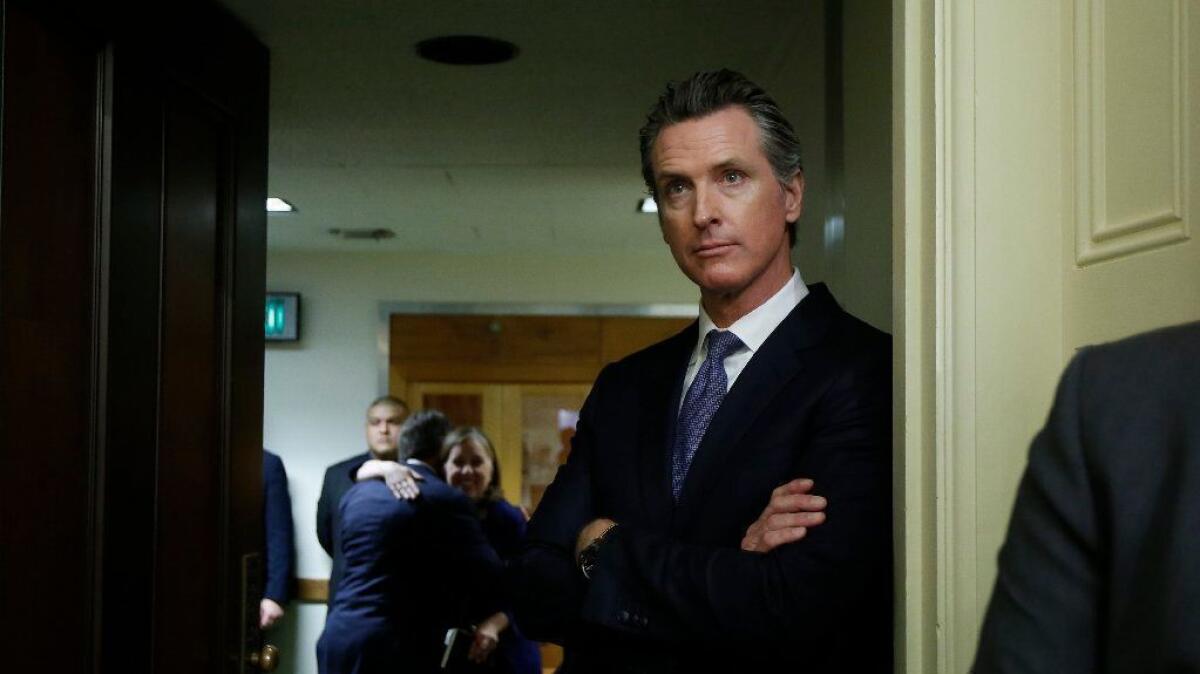A community planned to boost child care. Gov. Gavin Newsom vetoed the bill to do it

- Share via
SACRAMENTO — Some of Gov. Gavin Newsom’s staunchest supporters say they are baffled by his decision to block two Bay Area cities from raising local taxes — money that, in one community, would be used to boost child-care services for working-class families.
The governor’s decision late last week to veto legislation on the issue may not be the final word for either city, but it caught local leaders off guard on an effort that had been decidedly noncontroversial as it made its way through the California Legislature.
“I am a little bit perplexed,” Assemblyman Mark Stone (D-Scotts Valley), the bill’s author, said Thursday.
Stone’s bill was rejected by Newsom on July 12, one of two bills vetoed before the governor left the state on vacation, the first two he has refused to sign since taking office. The two-page proposal would have allowed Scotts Valley in Santa Cruz County and Emeryville in Alameda County to exceed the statewide cap on local sales taxes — but only if voters approved the plans next year.
“We’re bewildered why he would deprive Emeryville voters of their opportunity to continue the community’s good work,” said John Bauters, an Emeryville city councilman.
California law limits local governments to a 2% sales tax, collected on top of the statewide rate of 7.25%. Because most of the allowable local tax is often imposed on the county level, individual cities can end up with very little room to impose their own levies.
In a brief written veto message, Newsom asserted that neither city needed an exemption from current law.
“The Cities of Emeryville and Scotts Valley have not reached the statewide cap of 2 percent, making it unclear why additional tax authority is needed,” he wrote.
But in the case of Emeryville, a 2-square-mile city nestled next to the San Francisco-Oakland Bay Bridge, Newsom’s statement is at odds with multiple other tax law analyses.
A state Senate committee analysis last month concluded that Alameda County has three separate half-cent local sales taxes already in place, plus an additional half-cent sales tax that applies to Bay Area counties using the region’s main public transit system. Those four levies, the report points out, mean Emeryville voters can’t impose a new local tax without approval from the Legislature and Newsom.
Emeryville officials have been studying the idea of a November 2020 ballot measure to pay for emergency services and help cover expected cost increases in a child-care center relied upon by low-income families. The city is one of only a handful in California that use taxpayer dollars to subsidize child-care efforts.
Ten days before issuing the veto, Newsom visited Emeryville to praise its efforts on low-income housing — homes that would probably be occupied by families using the city’s child-care center, Bauters said.
“This is an equity issue for our community,” he said. “The goal of this measure is to give Emeryville voters the chance to affirm that child care is important.”
Newsom’s office provided to The Times citations of an existing state statute to support the veto message’s assertion that Emeryville can add a new sales tax without a change in state law, and noted state tax officials agree with that assessment. But the statute cites only the rules governing a neighboring county. Meanwhile, the city of Fremont, like Emeryville, in Alameda County, has also asked for permission to pursue a tax increase above the existing cap for local levies, a bill that’s pending at the state Capitol.
For Emeryville officials, the stakes would be especially high should they embrace the Newsom administration’s interpretation of the law. A subsequent legal challenge would not only jeopardize any new tax but could sour voters and local elected officials amid the confusion.
“The veto the governor issued will have a chilling effect on the ability of local governments to serve their people,” Bauters said.
Neither of the bills vetoed by Newsom last week — the sales tax proposal or an unrelated bill that would have expanded the weapons rights of retired University of California police officers — was considered controversial. The tax legislation, Assembly Bill 618, was opposed only by those who routinely argue against new taxes as a matter of principle.
The cities have few options for a do-over this year. The Legislature, currently on summer recess, returns next month for one final month of work in 2019. Resubmitting the proposal in a different bill would be challenging. Even then, Newsom’s veto message leaves little room for doubt as to how he views the issue.
Scotts Valley Mayor Jack Dilles said Thursday that his city has very few options to balance its books other than cuts to public safety services. He and others noted that former Gov. Jerry Brown approved similar efforts by California communities to put the issue of new taxes to their voters.
“Gov. Newsom is a mystery here,” Dilles said. “We see this as a local issue.”
More to Read
Sign up for Essential California
The most important California stories and recommendations in your inbox every morning.
You may occasionally receive promotional content from the Los Angeles Times.














